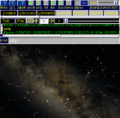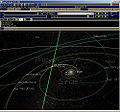- Digital Universe Atlas
-
Digital Universe Atlas Original author(s) Brian Abbott, Carter Emmart, Steven Marx, Ryan Wyatt Developer(s) American Museum of Natural History's Hayden Planetarium, National Aeronautics and Space Administration Initial release 2002 Operating system Windows, Mac OS X, Linux, AmigaOS 4, IRIX Platform PC Type Educational software License Illinois Open Source License Website www.haydenplanetarium.org/universe Digital Universe Atlas or Digital Universe is a free open source software planetarium application, available under the terms of the Illinois Open Source License, and running on Linux, Windows, Mac OS X (10.5 and above), AmigaOS 4, and IRIX.
It is a standalone 4-dimensional space visualization application built on the programmable Partiview data visualization engine designed by Stuart Levy of the National Center for Supercomputing Applications (NCSA) as an adjunct of the NCSA's Virtual Director virtual choreography project. The Virtual Universe Atlas project was launched by the American Museum of Natural History's Hayden Planetarium with significant programming support from the National Aeronautics and Space Administration as well as Stuart Levy. The database draws on the National Virtual Observatory.
A far more powerful visualization engine than any other existing freeware application, it is nevertheless still far less widely known among amateur astronomers.
Along with Celestia and Orbiter, and unlike most other planetarium applications, Digital Universe shares the capacity to visualize space from points outside Earth. Building on work by Japan's RIKEN, its planet renderings and zoom visualizations can match or exceed Celestia and Orbiter. Unlike Celestia and Orbiter, highly accurate visualization from distances beyond the Milky Way galaxy is integral to the software and the datasets. This allows for unrivaled flexibility in plotting itineraries that reveal true distances and configurations of objects in the observable sky. It therefore improves understanding of the surroundings of the solar system in terms of observer-neutral celestial coordinate systems -- systems that are neither geocentric nor heliocentric -- such as the galactic coordinate system and supergalactic coordinate system. Here is how the project's developers characterize the purpose of the Digital Universe Atlas:
[U]nlike a globe of the Earth, a celestial globe has little practical use today. No one believes anymore, as scholars did in the Middle Ages, that the stars are lights on a uniformly distant sphere. Tracing a path from star to star on such a surface, as if it were the outline of a constellation, reveals next to nothing about the shifting perspective that a true stellar voyager might experience, or what our Sun might look like from another star. No flat map, no globe painted with stars, can accurately render the true three-dimensional spatial relations among the objects scattered across the sky.[1]The Digital Universe Atlas has spun off a commercial-grade planetarium platform from SCISS called UniView that was featured in the White House star party on October 7, 2009.[2] The Atlas database and Partiview interface is compatible with professional planetarium software such as Evans & Sutherland's Digistar and Sky-Skan's DigitalSky 2.
Contents
Screenshots
See also
- Celestia
- GeoWall
- Google Moon
- Google Mars
- Google Sky
- Orbiter
- RedShift
- SKY-MAP.ORG
- Starry Night
- Stellarium
- Universe Sandbox
- WorldWide Telescope
References
External links
- Official Website
- DU Forum
- DU mailing list
- Virtual Director project at the NCSA, the progenitor of Partiview
- Partiview
- Partiview user's guide
- Peter Teubern & Stuart Levy, Partiview reference manual
- Partiview mailing list
- University of Chicago Department of Astronomy & Astrophysics, "Partiview for Developers"
- Selden Ball, "Planets for Partiview"
- Partiview on GeoWalls
- University of Chicago Department of Astronomy & Astrophysics, "Downloads," other visualization plug-ins for Partiview
- UniView
- Evans & Sutherland Digistar
- Sky-Skan DigitalSky 2
- "The Known Universe" video simulation, American Museum of Natural History, December 15, 2009, using the DUA database and visualized using UniView
- Brian Abbott, Carter Emmart, and Ryan Wyatt, "Virtual Universe," Natural History, April 2004
- "3-D Tour Puts Stars within Reach," Wired Magazine, June 3, 2003
- Slashdot discussion, July 25, 2002
- Digital universe atlas - 3D atlas of the universe - The known universe - Carter Emmart at ScienceStage
Categories:- AmigaOS 4 software
- Astronomy software
- Free astronomy software
- Linux planetarium software
- Mac OS X software
- Windows software
Wikimedia Foundation. 2010.



